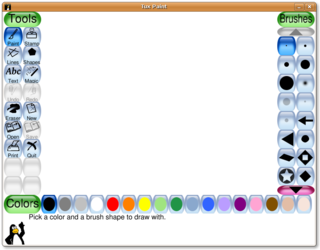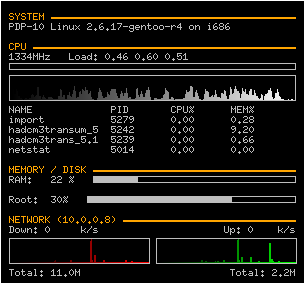The Rich Text Format is a proprietary document file format with published specification developed by Microsoft Corporation from 1987 until 2008 for cross-platform document interchange with Microsoft products. Prior to 2008, Microsoft published updated specifications for RTF with major revisions of Microsoft Word and Office versions.
DocBook is a semantic markup language for technical documentation. It was originally intended for writing technical documents related to computer hardware and software, but it can be used for any other sort of documentation.
Cabinet is an archive-file format for Microsoft Windows that supports lossless data compression and embedded digital certificates used for maintaining archive integrity. Cabinet files have .cab filename extensions and are recognized by their first four bytes MSCF. Cabinet files were known originally as Diamond files.

Damn Small Linux (DSL) is a computer operating system for the x86 family of personal computers. It is free and open-source software under the terms of the GNU GPL and other free and open-source licenses. It was designed to run graphical user interface applications on older PC hardware, for example, machines with 486 and early Pentium microprocessors and very little random-access memory (RAM). DSL is a live CD with a size of 50 megabytes (MB). What originally began as an experiment to see how much software could fit in 50 MB eventually became a full Linux distribution. It can be installed on storage media with small capacities, like bootable business cards, USB flash drives, various memory cards, and Zip drives.
Ctags is a programming tool that generates an index file of names found in source and header files of various programming languages to aid code comprehension. Depending on the language, functions, variables, class members, macros and so on may be indexed. These tags allow definitions to be quickly and easily located by a text editor, a code search engine, or other utility. Alternatively, there is also an output mode that generates a cross reference file, listing information about various names found in a set of language files in human-readable form.

A slide show, or slideshow, is a presentation of a series of still images (slides) on a projection screen or electronic display device, typically in a prearranged sequence. The changes may be automatic and at regular intervals or they may be manually controlled by a presenter or the viewer. Slide shows originally consisted of a series of individual photographic slides projected onto a screen with a slide projector. When referring to the video or computer-based visual equivalent, in which the slides are not individual physical objects.

The file command is a standard program of Unix and Unix-like operating systems for recognizing the type of data contained in a computer file.

Tux Paint is a free and open source raster graphics editor geared towards young children. The project was started in 2002 by Bill Kendrick who continues to maintain and improve it, with help from numerous volunteers. Tux Paint is seen by many as a free software alternative to Kid Pix, a similar proprietary educational software product.
A number of vector graphics editors exist for various platforms. Potential users of these editors will make a comparison of vector graphics editors based on factors such as the availability for the user's platform, the software license, the feature set, the merits of the user interface (UI) and the focus of the program. Some programs are more suitable for artistic work while others are better for technical drawings. Another important factor is the application's support of various vector and bitmap image formats for import and export.
Beamer is a LaTeX document class for creating presentation slides, with a wide range of templates and a set of features for making slideshow effects.

PowerPoint animation is a form of animation which uses Microsoft PowerPoint and similar programs to create a game or movie. The artwork is generally created using PowerPoint's AutoShape features, and then animated slide-by-slide or by using Custom Animation. These animations can then be shared by transferring the PowerPoint file they were created in, and can be viewed with PowerPoint or Microsoft's free PowerPoint Viewer and are often exported to video formats such as mp4.

Conky is a free software desktop system monitor for the X Window System. It is available for Linux, FreeBSD, and OpenBSD. Conky is highly configurable and is able to monitor many system variables including the status of the CPU, memory, swap space, disk storage, temperatures, processes, network interfaces, battery power, system messages, e-mail inboxes, Arch Linux updates, many popular music players, weather updates, breaking news, and much more. Unlike system monitors that use high-level widget toolkits to render their information, Conky is drawn directly in an X window. This allows it to be configured such that it consumes relatively few system resources.
Quick Look is a quick preview feature developed by Apple Inc. which was introduced in its operating system Mac OS X 10.5 Leopard. The feature was announced at the Worldwide Developers Conference on Jun. 11, 2007.

Uzbl is a discontinued free and open-source minimalist web browser designed for simplicity and adherence to the Unix philosophy. Development began in early 2009 and is still considered in alpha software by the developers. The core component of Uzbl is written in C, but other languages are also used, most notably Python. All parts of the Uzbl project are released as free software under GNU GPL-3.0-only.

Hollywood is a commercially distributed programming language developed by Andreas Falkenhahn which mainly focuses on the creation of multimedia-oriented applications. Hollywood is available for AmigaOS, MorphOS, WarpOS, AROS, Windows, macOS, Linux, Android, and iOS. Hollywood has an inbuilt cross compiler that can automatically save executables for all platforms supported by the software. The generated executables are completely stand-alone and do not have any external dependencies, so they can also be started from a USB flash drive. An optional add-on also allows users to compile projects into APK files.
Microsoft Office shared tools are software components that are included in all Microsoft Office products.

OpenCards is a free spaced repetition flashcard program. The software is similar to SuperMemo, Anki or Mnemosyne.
Impressive is a free and open-source software that displays presentation slides with 3D-effects. It is a lightweight and easy to use console presentation software with focus on PDF documents and images. It was started by Martin Fiedler in 2005.








